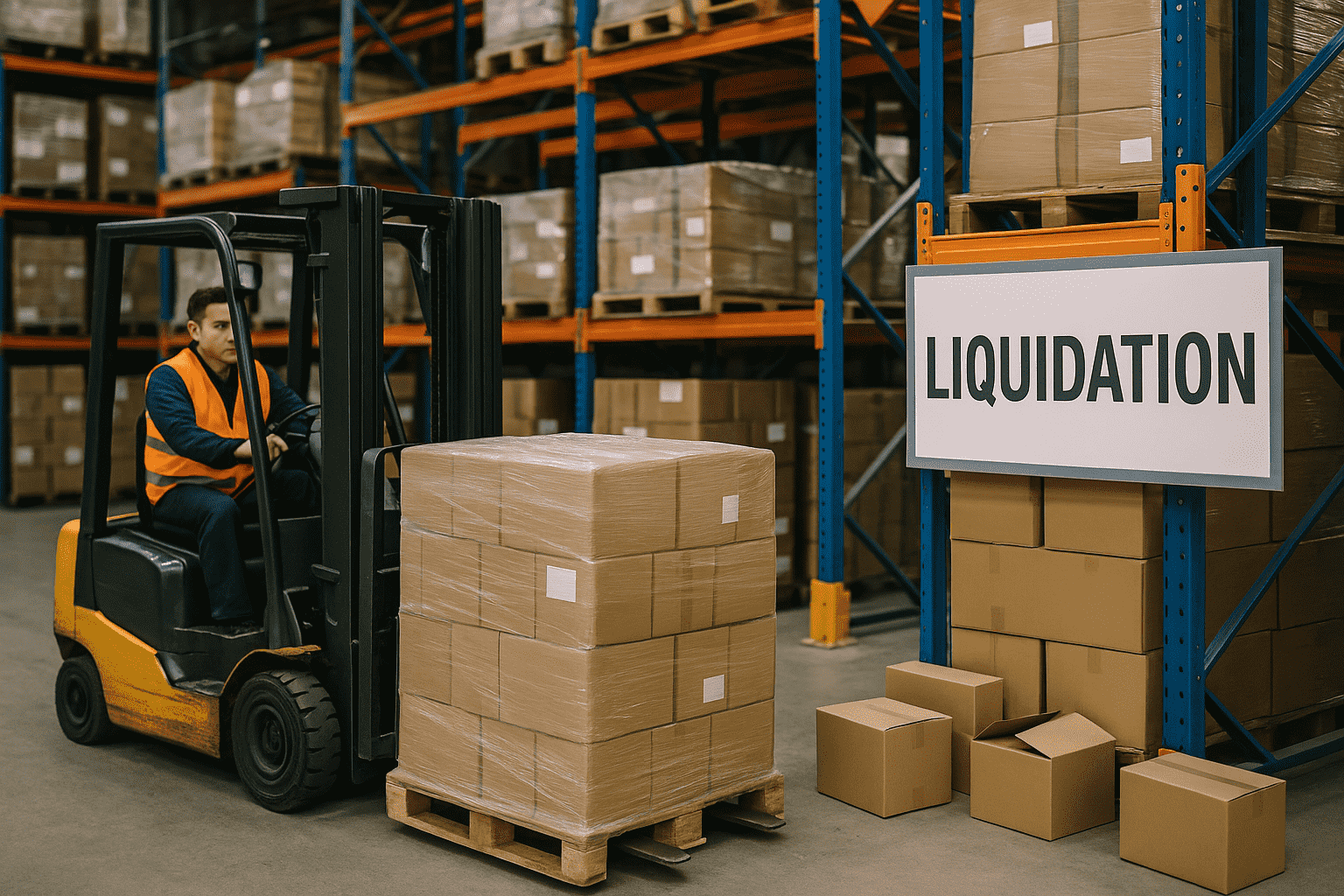Warehouse Liquidators: What They Do & Why You Need One

Warehouse liquidation with the help of warehouse liquidators allows businesses to recover maximum value from surplus, obsolete, or idle assets within warehouses and distribution centers.
In this blog, you’ll learn what warehouse liquidators do, the range of services they provide, and why partnering with the right expert is essential for optimizing value recovery, minimizing downtime, and ensuring a smooth, compliant transition for your business.
What Are Warehouse Liquidators?

Warehouse liquidators are specialized professionals or firms that manage the sale and removal of excess and obsolete (E&O), or idle inventory, equipment, and infrastructure from warehouses, distribution centers, and industrial facilities. Their core service is to convert non-performing assets into cash as efficiently as possible, helping businesses recover value from what would otherwise tie up space and working capital.
When Should You Hire a Warehouse Liquidator?

Warehouse liquidators play a crucial role in a variety of business transitions and operational changes. Some of the most common scenarios where their expertise is essential include:
a) Downsizing
When businesses reduce their physical footprint or consolidate multiple sites, liquidators help clear out surplus equipment, racking, and inventory to maximize asset recovery and minimize carrying costs.
b) Relocation
During warehouse or facility moves, liquidators manage the sale or disposition of assets that are not needed at the new location, ensuring only essential items are transferred and surplus is monetized.
c) Closure
If a business is closing a warehouse or distribution center—whether due to restructuring, bankruptcy, or strategic exit—liquidators orchestrate the rapid, compliant sale and removal of all assets, streamlining the shutdown process.
d) Inventory Surplus
Excess, obsolete, or slow-moving inventory ties up valuable warehouse space and working capital. Liquidators help businesses recover value from this stock, converting idle assets into cash before they depreciate further.
e) Reorganization
Operational restructuring often leads to redundant or underutilized assets. Liquidators assess, value, and remarket these items, supporting efficient redeployment or monetization in line with new business strategies.
How Do Warehouse Liquidators Operate?

Unlike general asset buyers, who often purchase goods in bulk at steep discounts for resale, or auctioneers, who simply facilitate a bidding process, warehouse liquidators take an active, end-to-end solution as part of their liquidation management. The scope of a warehouse liquidator’s services typically includes:
1. Asset Inventory and Valuation
- Conducting a full audit and cataloging of all equipment, inventory, racking, MHE (material handling equipment), and infrastructure.
- Assessing asset condition, age, and market demand through appraisals and valuation.
- Providing accurate, data-driven valuations for resale, redeployment, or recycling.
2. Strategic Marketing and Sales
- Developing custom sales strategies based on asset type and market demand.
- Marketing assets directly to pre-vetted buyer networks: industrial end-users, dealers, resellers, and international buyers.
- Managing negotiations, offers, and counteroffers to maximize recovery.
3. Logistics, Removal, and Site Clearance
- Coordinating all asset removal, decommissioning, and site clearance activities.
- Arranging for heavy lifting, dismantling, and safe transport.
- Overseeing timelines to minimize business disruption and ensure prompt clearance.
4. Compliance and Documentation
- Handling all regulatory, safety, and environmental compliance for asset transfer and disposal.
- Providing comprehensive documentation for audits, tax purposes, and chain-of-custody tracking.
- Ensuring secure data destruction or debranding when required.
5. Reporting and Project Management
- Delivering regular progress updates and transparent reporting on sales and clearance milestones.
- Streamlining communications and decision-making.
How to Choose the Right Warehouse Liquidator?

Selecting the right warehouse liquidator can make a significant difference in how much value you recover, how smoothly your project runs, and how well you meet compliance standards. With the right partner, you streamline every phase—from initial audit to final clearance—while minimizing risk and internal workload. The following criteria are essential when evaluating your options:
1. Experience
Look for liquidators with a proven track record in your industry and with projects similar in scale and complexity. Experienced liquidators bring specialized knowledge in asset valuation, market dynamics, and logistics, ensuring you avoid common pitfalls and recover the highest possible value from your assets.
2. Buyer and Seller Networks
The strength of a liquidator’s buyer and seller networks directly impacts your recovery value and sales timeline. Choose a partner with established relationships across a wide spectrum of industrial buyers, dealers, resellers, and international markets. A robust network ensures your assets reach serious, qualified buyers—accelerating sales, driving competitive offers, and maximizing overall returns.
Note: Reliable liquidators also maintain networks of sellers, which can streamline asset redeployment or trade when needed.
3. Logistical Support and Guidance
Seamless logistics are essential for a successful warehouse liquidation. Work with a liquidator who offers end-to-end support, including asset removal, secure packaging, transportation, and site clearance. Whether you need guidance on complex equipment moves or full-service coordination, the right liquidation partner will minimize disruption to your operations, safeguard asset condition, and keep your project on schedule from start to finish.
4. Tech-Enabled Platform or Tools
Prioritize warehouse liquidators that utilize modern, tech-enabled platforms for asset tracking, valuation, and sales management. Digital tools—such as centralized asset registries, real-time pricing analytics, and online documentation—bring greater transparency, speed, and accuracy to the entire liquidation process. A tech-driven approach helps you monitor progress, access real-time market insights, and ensure every asset is accounted for from listing through sale.
5. Compliance Expertise
Effective liquidation requires strict adherence to regulatory, safety, and environmental standards, especially when dealing with equipment, hazardous materials, or sensitive data. Select a liquidator with deep compliance expertise and a clear understanding of local, state, and federal requirements. A knowledgeable partner ensures proper documentation, secure asset handling, and full regulatory alignment, protecting your business from costly penalties and future liabilities.
How Amplio Supports Warehouse Liquidation

1. Centralized Asset Documentation and Management
Amplio's system catalogs, documents, and tracks all of your surplus assets. We worry about their disposition so that you don't have to.
2. Extensive Network of Pre-Vetted Buyers
Tap into Amplio’s robust marketplace of qualified industrial buyers and resellers. This network accelerates asset sales, increases competitive bidding, and drives higher recovery values for your surplus equipment and inventory.
3. Compliance, Logistics, and Reporting Support
Our team works closely with you in covering every detail—from regulatory compliance to logistics coordination and secure removal. You receive expert guidance at each step, reducing risk and administrative burden.
4. Functions as Your In-House Liquidation Team
Amplio acts as an extension of your internal team. We handle all the processes involved in liquidation-led warehouse disposition, ensuring a seamless and professional asset disposition experience.
Contact us today to maximize your warehouse asset recovery and experience a more efficient, profitable liquidation process.